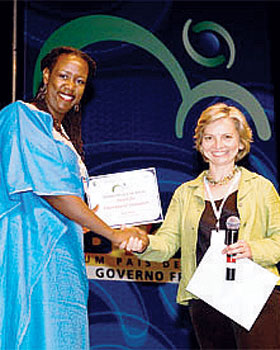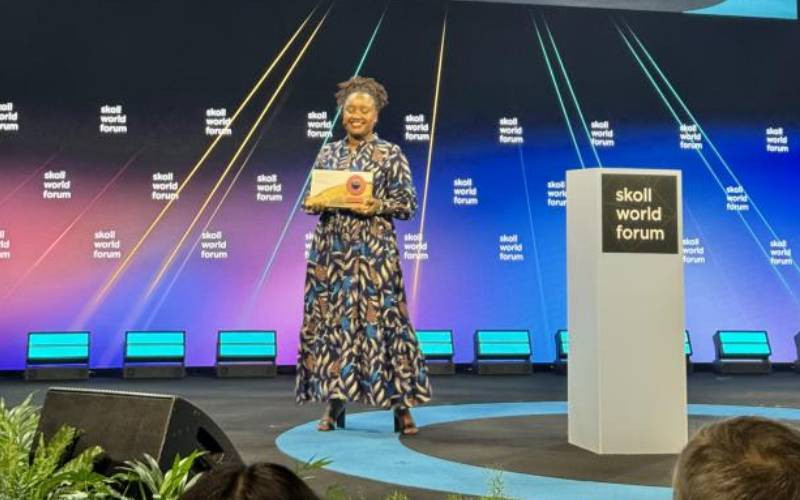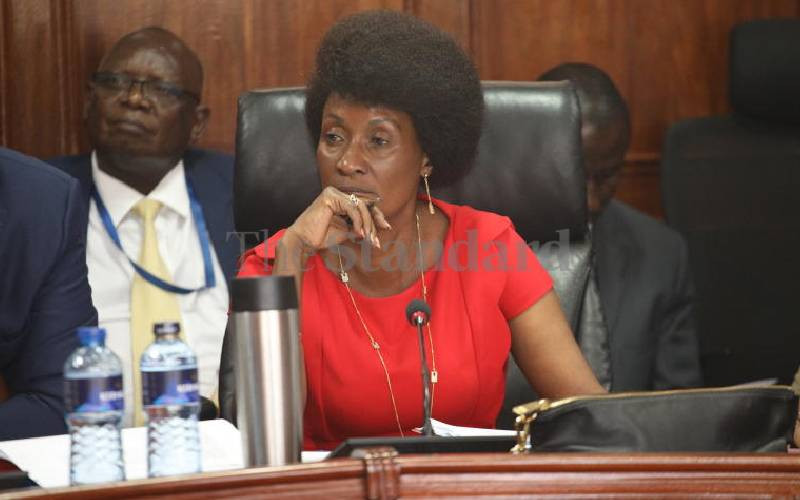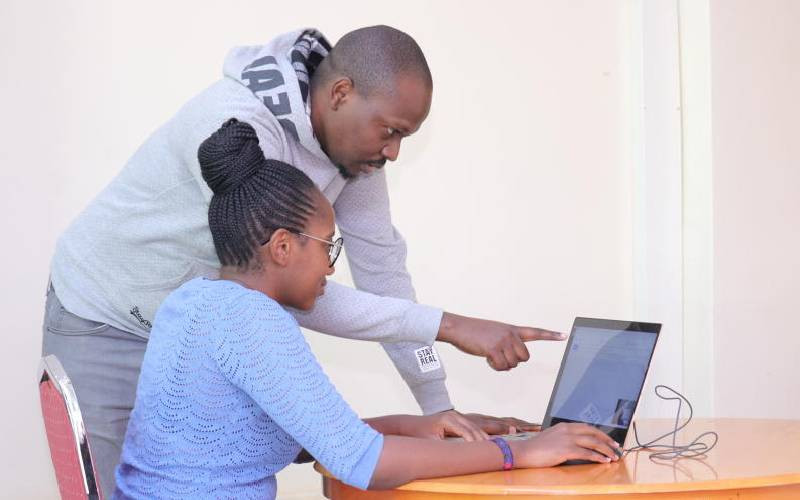Thanks to Good Samaritans, Dr Wanjiru Kamau-Rutenberg, 33, is now a professor of Politics at a US university. Through Akili Dada, she is investing in the lives of poor talented girls, writes NJOKI CHEGE
Throughout her life, Dr Wanjiru Kamau-Rutenberg, 33, has been put through school by well-wishers.
First it was her uncle who lived in the US who invited Wanjiru (then in her teens) to study in a public high school there.
Afterwards, she landed a scholarship to take a degree in Politics with a minor in Gender and African Studies at the Whitman College in the US.
She then did a Masters degree in Political Science and a Doctorate in Political Science at the University of Minnesota, still in the US on yet another scholarship.
 |
Wanjiru accepts a United Nations award after winning the market place of ideas competition 2010.
[PHOTOS: JOSEPH KIPTARUS/COURTESY] |
But it was while Wanjiru was doing her PhD research on Kenyan women and access to decision making that she realised just how much Kenyan women were under-represented in the county’s leadership.
“I wanted to do something about this leadership vacuum and the first place to start was to improve the level of access to education among Kenyan girls from poor families,” says Wanjiru.
All the while, the idea of Akili Dada was brewing in her mind. At first, it was just an idea, until it became a conviction so strong that Wanjiru actualised her plans.
In 2006, Wanjiru and her husband Dr Isaac Rutenberg sponsored the first four girls to different high schools.
To get these girls, she and her best friend Mueni Maluki, then an Akili Dada board member, went round schools to look for bright girls who could not afford to pay their school fees.
Wanjiru and her husband (newly married then) used their savings and a donation from a close friend to sponsor these girls, and that’s how the Akili Dada dream became a reality.
Stay informed. Subscribe to our newsletter
Donation from friends
From then on, Wanjiru has been convincing friends and acquaintances from the US and Kenya to give donations towards educating these girls.
If everyone who has benefited from goodwill were to pass on that generosity, Wanjiru says more brilliant girls would be able to access education.
Says Wanjiru: “If we could all help the younger ones, then we would have a generation of excellent, well-informed and exposed leaders.”
Akili Dada is not just about sponsoring bright girls to high school, as Wanjiru explains: “This is a leadership incubator, where we build, train and nurture these girls into leadership.”
The organisation works with schools like Precious Blood Riruta, Kenya High and Loreto Limuru.
So how does the programme work?
The organisation gets a list of the needy cases from these schools, then the girls are asked to apply for the scholarships and shortlisted for an interview.
The criterion for selection not only takes into account the girls’ academic prowess, but also their leadership skills.
“The girls need to express their initiative to serve other people, because we want all-rounded girls who will become the future leaders of this country,” explains Wanjiru.
The girls also undergo a leadership training programme where they are taught community service.
The selected girls are taken to homes for children, the elderly and the less fortunate.
Akili Dada also offers mentorship to these girls.
“We are encouraging professional Kenyan women to mentor our girls into successful careers. The idea is to expose these scholars to an array of careers so that they can make informed career choices,” quips Wanjiru.
So, why the name Akili Dada?
She explains: “Akili is a Swahili word that means brains. However, in this context, it goes beyond brains into competence, ability and strategy. It is not only about being book-smart, but having the ability to make decisions as a leader. Dada means sisters, and we want to create a sisterhood of young and older girls who bring out the best in each other.”
Currently, Akili Dada has 44 girls, with 33 studying in various high schools in Kenya.
The other eleven are in university or preparing to join campus.
So far, the lowest grade ever recorded among the Akili Dada beneficiaries is a B+.
Although the initiative does not sponsor these girls into university, they work closely with Zawadi Africa to organise scholarships for needy cases.
After their high school education, the girls undergo an internship programme at Akili Dada offices at Hazina Towers, Nairobi.
Finances for school fees come mainly from friends and well-wishers from the US and Kenya.
Noting that there are more needy cases the programme would wish to sponsor, Wanjiru challenges more Kenyans to invest in the lives of these girls by giving donations.
Says Wanjiru, “I would like Kenyan women to think about all the women in their lives who helped them get to where they are right now, and in their honour, educate younger girls who today are where you were several years ago.”
In 20 years time, Akili Dada envisions an era where the nation will be steered by their alumni, besides creating a network of women who have gone out of their way to make other people’s lives better and more meaningful.
So what drives her?
“Hope drives me. I am an optimistic person. I draw inspiration from the journey of these scholars and when I see where they have come from, I feel encouraged and hopeful,” she says.
While Akili Dada is her passion, Wanjiru, who is married to Dr Isaac Rutenberg, spends her day as an assistant professor of Politics at the University of San Francisco, USA, where she teaches politics, gender, international aid and development.
Wanjiru is here on a three-month summer break and is busy mentoring the girls and sourcing for funds for scholarships.
 The Standard Group Plc is a
multi-media organization with investments in media platforms spanning newspaper
print operations, television, radio broadcasting, digital and online services. The
Standard Group is recognized as a leading multi-media house in Kenya with a key
influence in matters of national and international interest.
The Standard Group Plc is a
multi-media organization with investments in media platforms spanning newspaper
print operations, television, radio broadcasting, digital and online services. The
Standard Group is recognized as a leading multi-media house in Kenya with a key
influence in matters of national and international interest.
 The Standard Group Plc is a
multi-media organization with investments in media platforms spanning newspaper
print operations, television, radio broadcasting, digital and online services. The
Standard Group is recognized as a leading multi-media house in Kenya with a key
influence in matters of national and international interest.
The Standard Group Plc is a
multi-media organization with investments in media platforms spanning newspaper
print operations, television, radio broadcasting, digital and online services. The
Standard Group is recognized as a leading multi-media house in Kenya with a key
influence in matters of national and international interest.









